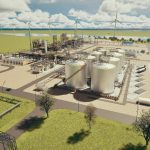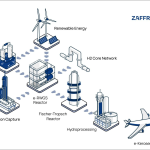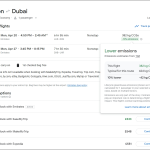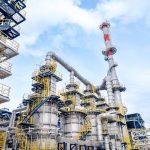Airbus has reaffirmed its commitment to hydrogen-powered flight to help reduce aviation’s carbon emissions, just over a month after shelving an earlier, high-profile concept under its ZEROe programme, citing slow development of essential technology. At a technical briefing held at its Toulouse headquarters, the company revealed a new focus on fully electric aircraft energised by hydrogen fuel cells. It also announced it is exploring a next-generation narrowbody aircraft, powered by up to 100% sustainable aviation fuel and featuring new propulsion and construction technologies, for entry into service in the second half of the 2030s. Additionally, Airbus highlighted its participation in four more projects: two to more deeply investigate non-CO2 emissions, one to build demand for SAF through a new book-and-claim process and another to use aviation and aerospace technologies to support nature-based initiatives.
The Airbus Summit 2025, convened to highlight the company’s plans to advance commercial aviation technologies in coming decades, was headlined by the reset of the ZEROe programme, which previously targeted 2035 for the entry into service of a clean-sheet hydrogen-powered airliner.
“Hydrogen is at the heart of our commitment to decarbonise aviation,” assured Airbus Head of Future Programmes, Bruno Fichefeux. “While we’ve adjusted our roadmap, our dedication to hydrogen-powered flight is unwavering.
“Just as we saw in the automotive sector, fully electric aircraft powered by hydrogen fuel cells have the potential in the longer term to revolutionise air transport for the better, complementing the sustainable aviation fuel pathway.”
The company highlighted “a new, notional concept” of a hydrogen aircraft powered by four two-megawatt electric engines, each using a fuel cell system to create electrical energy from oxygen and hydrogen, the latter fed from two liquid hydrogen fuel tanks.
For the past five years, said Glenn Llewellyn, Head of the Airbus ZEROe programme, the company had explored multiple hydrogen propulsion concepts before focusing on a fully electric powertrain, described by the company as “the most promising pathway” to a commercially viable hydrogen-powered aircraft.
“We are confident it could provide the necessary power density for a hydrogen-powered commercial aircraft and could evolve as we mature the technology,” he explained. “In coming years, we will concentrate on advancing the storage, distribution and propulsion systems, while also advocating for the regulatory framework needed to ensure these aircraft can take flight.”

Having demonstrated a 1.2 MW hydrogen propulsion system in 2023, followed last year by tests of an integrated fuel cell stack, electric motors, gearboxes, inverters and heat exchangers, Airbus and Air Liquide Advanced Technologies are now partnering to address the challenges of liquid hydrogen handling and distribution in flight.
Together, said Airbus, they have developed the Liquid Hydrogen BreadBoard, integrated ground testing of which is planned for 2027. This will be performed in the Electric Aircraft System Test House in Munich, where the propulsive bench and hydrogen distribution system will be combined for validation.
Airbus also previewed multiple concepts being studied for a next-generation single aisle aircraft, featuring a range of new technologies capable of using 100% SAF and offering 20-30% more fuel efficiency than current models.
Among the technologies being studied are more efficient engines including open fan designs; long, folding wings to deliver improved aerodynamics; next-generation batteries to support both propulsive and non-propulsive functions of new aircraft; lightweight materials; and integrated systems.
“We have the most advanced aircraft portfolio in the market, and the A321XLR is at the very forefront of today’s single-aisle aircraft technology,” claimed Fichefeux. “Now we are taking the best of what we’ve done and preparing another jump to make our single-aisle aircraft even better and pioneer the future of flight, when the time is right.”
To advance research on contrail mitigation and the non-CO2 impacts of aircraft, Airbus announced participation in two programmes, one in Europe, the other in Canada.
In specific meteorological conditions, soot particles expelled from aircraft engines freeze, with ice particles then creating cloudy canopies which can trap heat in the atmosphere. In Europe, Airbus is leading a four-nation consortium of 11 partners in an EU-funded project called PACIFIC, short for Particle Emissions, Air Quality and Climate Impact related to Fuel Consumption and Engine Cycle.
The programme, which will operate until June 2028, is designed to improve modelling and prediction capabilities for contrails by testing a wide range of fuels, including SAF, and better understanding how soot is formed within engines.
The research will incorporate both laboratory tests and full-scale ground testing of aircraft to explore how soot forms during fuel combustion and use improved prediction tools to anticipate its presence in emissions.
“Recent studies suggest that the use of sustainable aviation fuels could reduce both soot particles and contrail ice crystals,” explained Airbus. “However, additional information on fuel composition and its processing in the engine is necessary to better understand the effects and benefits of SAF.
“PACIFIC seeks to bridge the gap in understanding aviation’s non-CO2 emissions by testing an unprecedented range of fuels under controlled conditions. It will also analyse the quantity of fine particles released at different engine power levels, refining methods to estimate their impact from ground tests to real flight conditions.”
Together with Airbus, PACIFIC partners include Rolls-Royce in both Germany and the UK; Finnish global SAF producer Neste; the German aerospace research organisation DLR; universities in Germany, Finland and UK; and innovation group Erdyn Consultants.
As well, in Canada, Airbus has joined with aerospace, academic and research organisations in another project to measure non-CO2 emissions created by different jet fuels, including 100% SAF.
Their project, called CRYSTAL (Contrail Research Yielding STimulating Advanced RQL Learning), will include ground and flight testing at and from the Airbus A220 programme headquarters in Mirabel. Ground tests are scheduled to begin in Q3 of this year, with flight tests commencing in 2027 using an Airbus A220 test aircraft.
They will be performed using both conventional Jet A1 fuel and 100% SAF to study the effects on emissions and contrail properties of both products and their respective climate impacts, with the data collected to be used by scientists to improve contrail assessment models and identify both engine technologies and fuels which could limit climate impacts.
Airbus likened the CRYSTAL programme to the VOLCAN and ECLIF3 projects it has previously undertaken in Europe with aircraft from its A320neo and widebody A350 families.
Partners in CRYSTAL project include Aéroports de Montréal, which manages Mirabel Airport, Polytechnique Montréal, École de technologie supérieure and FSM Management Group, with further support being sought from government programmes including Canada’s Initiative for Sustainable Aviation Technology (INSAT) and Consortium for Research and Innovation in Aerospace in Québec (CRIAQ).
Airbus has also formed another alliance with partners including airlines, aircraft lessors and financiers to help accelerate the global uptake of SAF by establishing a new book-and-claim programme, through which SAF certificates can be purchased, enabling the physical fuel to be used elsewhere, but enabling the certificate purchaser to claim the attached emission reductions.
Airbus will purchase SAF certificates and manage the associated sustainability attributes through the registry of the Roundtable on Sustainable Biomaterials (RSB), a recognised certification body. The certificates will then be sold to customers such as aircraft and helicopter operators, driving up SAF production and use.
“For a lot of smaller operators, getting access to SAF can be challenging, depending on the amount of SAF needed,” said Julien Manhes, Airbus Head of Sustainable Aviation Fuel and Carbon Dioxide Removals.
“Through this initiative, Airbus can simplify and derisk the process for operators and SAF suppliers by financially securing SAF certificates upfront and sharing them when customers need them.”
Initial MoUs have been signed by lessors SMBC Aviation Capital and AerCap, charter airlines Comlux and Luxaviation, the zero-gravity flight research group Novespace, a subsidiary of the French Space Agency, special mission aviation provider SAF Aerogroup, and Paris-based Rive Private Investment.
Meanwhile, the Airbus Foundation has entered a three-year partnership with Solar Impulse Foundation to jointly identify and progress the adoption of scalable nature-based projects “that address pressing global challenges”.
The two organisations will actively seek proposals for nature-based solutions to global issues including ecosystem degradation, water security and natural disaster risk that could benefit from the deployment of aerospace resources including helicopters and satellite data for earth observation and verification. Successful applicants will receive €10,000 ($10,800) in seed funding for their projects as well as access to technical expertise to accelerate their work.
“By combining aerospace technology with nature-based solutions, we can turn innovation into impact,” said Bertrand Piccard, Initiator and Chairman of the Solar Impulse Foundation. “Our partnership with the Airbus Foundation demonstrates how advanced capabilities like satellite imagery can help restore ecosystems, support economic development and build climate resilience where it’s needed most.”
Added Julie Kitcher, Airbus Chief Sustainability Officer and Chair of the Airbus Foundation: “Aerospace technologies allow us to unlock information about our planet that we cannot access from the ground. Using Airbus’ expertise in satellites and helicopters, we’re committed to empowering innovators and researchers to develop solutions that address pressing environmental and social challenges.”
Top image: A mock-up created in March 2025 to show what Airbus’ fully electric, hydrogen-powered ZEROe aircraft will look like, and how it could be operated at an airport. It features four engines each powered by their own fuel cell stack















More News & Features
SkyNRG reaches financial close for Dutch 100,000-tonne SAF facility
Concrete Chemicals consortium secures €350m public funding for German eSAF project
SAF One announces new investment and technology partners for Middle East SAF project
New studies confirm minor flight re-routing to avoid contrails would have major climate benefits
New initiative formed to accelerate SAF adoption and production in the Pacific Northwest
EcoCeres opens new Malaysia production facility as SAF ambition in Asia scales up